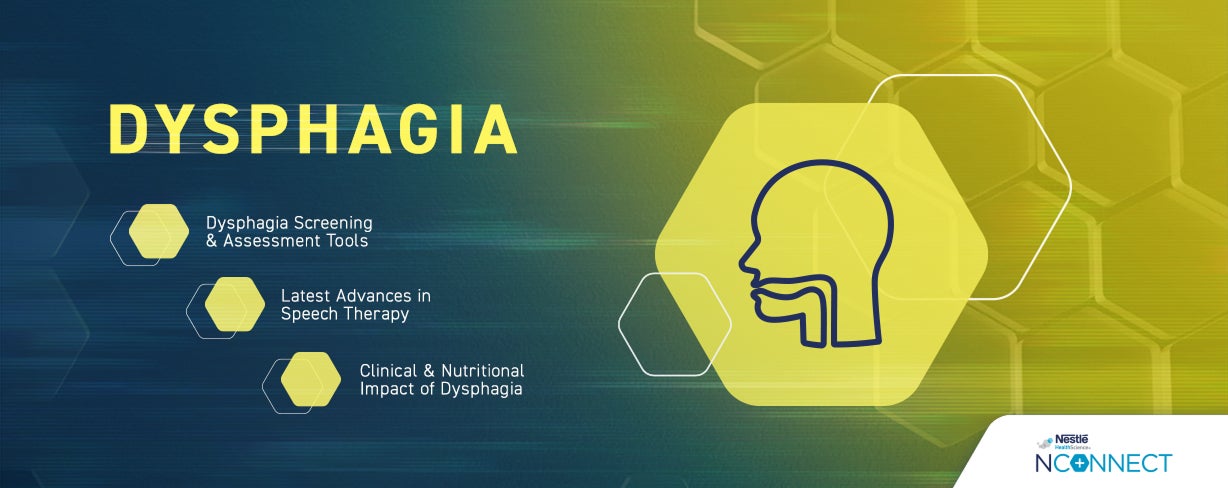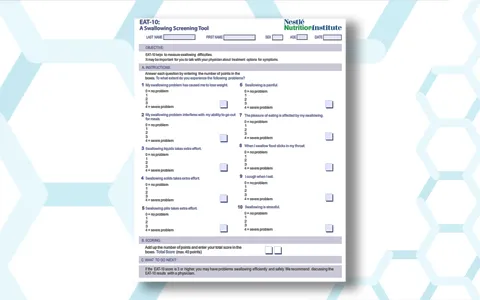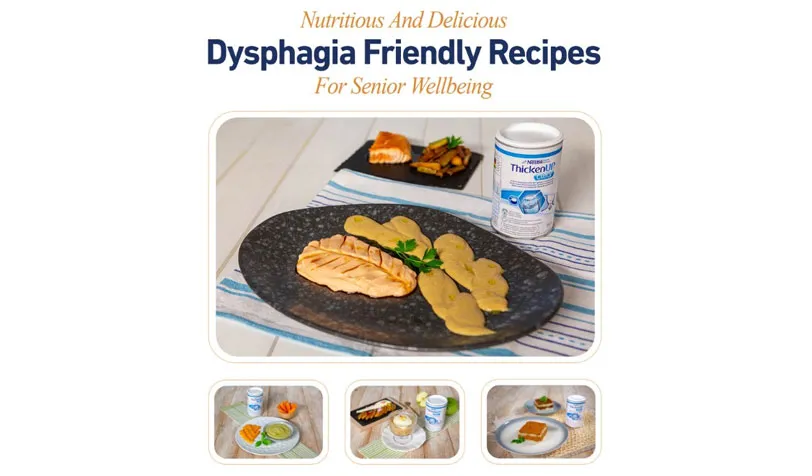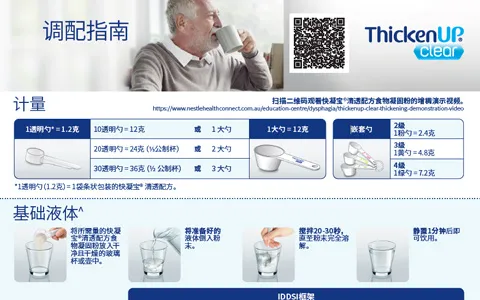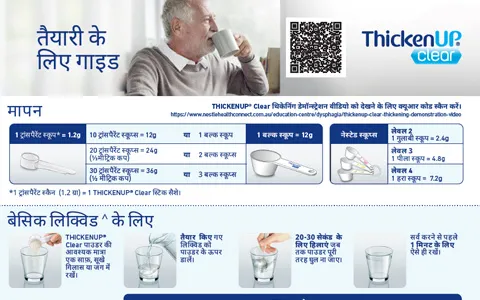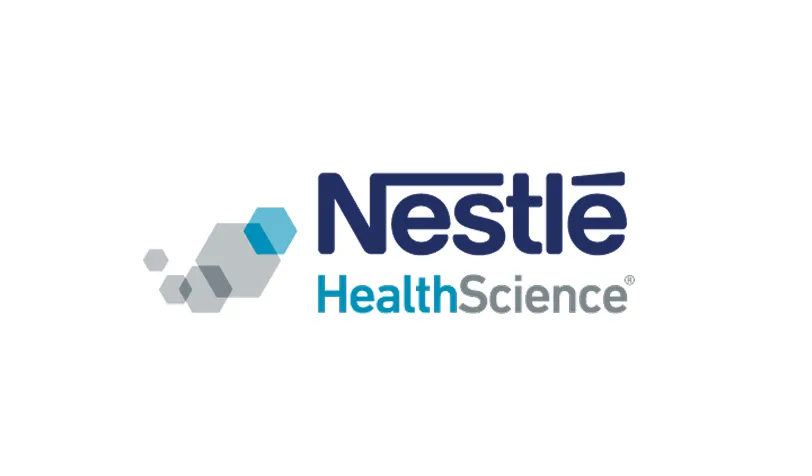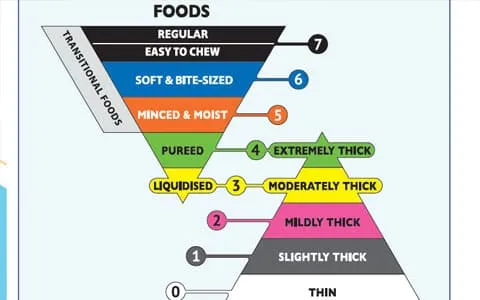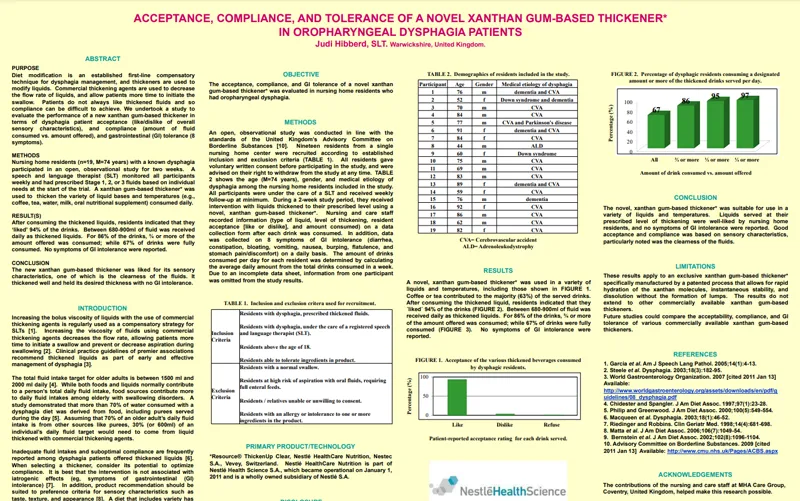Dysphagia
Highlight of the month
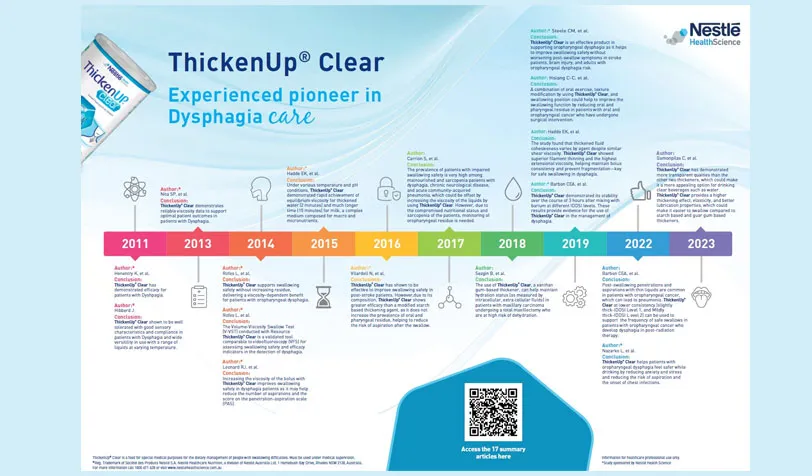
THICKENUP® Clear - Scientific Evidence Compendium
THICKENUP® Clear is the 1st xanthan gum-based thickener, scientifically proven to support dysphagia assessment and nutritional management.This Scientific Evidence Compendium summarises evidence from 17 studies that use THICKENUP® Clear. THICKENUP® Clear is a food for special medical purposes for the dietary management of people with swallowing difficulties. Must be used under medical supervision.
See moreThe EAT-10 is a validated dysphagia screening tool which is provided in an interactive format for accessibility and ease of use. This tool can be used by anyone to screen for symptoms of dysphagia, and refer on for further assessment if possible dysphagia is identified. It consists of 10 questions which provides an overall score (completed within 2 minutes).
This Recipe book includes 19 recipes that have been developed and tested to meet specific textures for people who need thickened liquids and pureed solid foods. The recipes refer to THICKENUP® Clear. THICKENUP® Clear is a food for special medical purposes for the dietary management of people with swallowing difficulties. Must be used under medical supervision.
Dysphagia at the Festive Table: Festive menus for adults with swallowing difficulty or Dysphagia and for the whole family
A recipe brochure for patients which uses SUSTAGEN Hospital Formula Neutral Flavour to create a No Melt Ice cream. The recipe also provides patients with serving suggestions as well as an indication of what IDDSI Framework Level this can be utilised in.
An online recipe booklet for thickening a variety of fluids utilising RESOURCE THICKENUP Clear and provide information about the IDDSI Framework. It also provides patients with guidelines on how much RESOURCE THICKENUP Clear should be utilised depending on which level of the IDDSI Framework is being adhered to.
This online training course has been developed in consultation with IDDSI, to enhance knowledge for non-speech pathologists working with individuals with dysphagia. It discusses the ‘what’ and ‘how’ of the IDDSI Framework, and will take approximately 1 hour to complete. Author: Nestlé Health Science, in consultation with IDDSI
This online resource for users of SUSTAGEN Hospital Formula and RESOURCE THICKENUP Clear provides recipes for these two products. The online RESOURCE provides an overview of how the world of texture-modified foods is changing and show how patients who need this, can have greater meal variety and improve dining with dignity.
A booklet that provides information about dysphagia including the symptoms of dysphagia, who it affects, how it is diagnosed and managed, as well as risk factors and problems that may occur because of it. The booklet also provides additional information for family, friends and caregivers to help those in their lives that are affected by dysphagia.
This publication provides current knowledge on pureed foods for people with dysphagia, developed by 6 global experts. Topics include chewing and swallowing solid foods, tools for screening and assessment, texture-modified diets in residential care settings, and benefits of commercially prepared pureed foods. Author: Experts on Chewing and Swallowing disorders and Nestlé Nutrition Institute
A recipe booklet for thickening Nestlé Health Science Oral Nutrition Supplements utilising THICKENUP Clear in accordance with the IDDSI framework.
Instructions on how to prepare the THICKENUP Gel Express bottle as well as mixing instructions for hot and cold beverages with reference to the IDDSI framework.
This systematic review explores the prevalence of dehydration in oropharyngeal dysphagia (OD), the relationship between OD severity and dehydration severity, the effect of thickened fluid therapy on hydration status in OD patients, and any potential negative or positive effect of thickened fluid therapy on hydration status. Click here to view the video
A poster which presents instructions on how to prepare the THICKENUP Gel Express bottle as well as mixing instructions for hot and cold beverages with reference to the IDDSI framework.
An online resource for patients showing the benefits of RESOURCE THICKENUP Clear and it's key clinical uses and information. The online resource also provides information about the recommend dosage of RESOURCE THICKENUP Clear according to the IDDSI Framework and what beverages of foods it can be utilised in.
An online A4 poster which presents patients and HCPS with information and instructions on how to prepare RESOURCE THICKENUP Clear with liquids. It also provides patients with guidelines on how much RESOURCE THICKENUP Clear should be utilised depending on which level of the IDDSI Framework is being adhered to.
An online poster designed by Nestle Health Science for the tea trolley chart with recipes for thickening a variety of fluids utilising RESOURCE THICKENUP Clear. It also provides patients with guidelines on how much RESOURCE THICKENUP Clear should be utilised depending on which level of the IDDSI Framework is being adhered to.
RESOURCE THICKENUP Clear is a food and drink thickener with proven efficacy and high acceptability among patients and healthcare providers. This online RESOURCE aims to detail the value that RESOURCE THICKENUP Clear brings to patients by highlighting the key benefits and features of the product. It also provides an overview of the current situation of oropharyngeal dysphagia in aged care facilities and our healthcare system, highlighting the need for a product such as RESOURCE THICKENUP Clear.
An online brochure which summarises the evidence to support the use of RESOURCE THICKENUP Clear in the management of dysphagia. The online RESOURCE also provides an overview of dysphagia and who is affected, which is supported by various statistics that provide an overview of the current situation of dysphagia in hospital, aged care and community settings.
An open, observational study that was conducted to look at the acceptance, compliance and gastrointestinal (GI) tolerance of a xanthan gum-based thickener in aged care residents with dysphagia. The study found that the xanthan gum-based thickener was liked for its sensory characteristics, thickened well and held it's desired thickness with no GI intolerance.
External Link
In this meta-analysis of randomised control trials, it details how texture-modified diets increase dietary intake of energy and protein in addition to fluif intake for adults with dysphagia.
In this international survey, it explores current knowledge gaps regarding malnutrition and dysphagia among healthcare professionals across 54 countries and discusses opportunties for improved care, management and identification strategies.
This case report presents the clinical experience with four cases of post-stroke dysphagia. A comprehensive approach to management with thickened fluids decreased the risk of aspiration pneumonia and facilitated effective management of dietary recommendations both during hospitalisation and after discharge.
This literature review demonstrates that the EAT-10 dysphagia screening tool can be used as a primary screening instrument for detecting dysphagia in routine clinical practice, and provides complementary information to other diagnostic tools.
This study aims at Identifying the risk factors for dysphagia in ICU patients with COVID-19 pneumonia requiring invasive mechanical ventilation, and at determining the frequency of postextubation dysphagia in this population.
This study investigates the therapeutic effect of a xantham-gum based thickener on the swallowing function of patients with dysphagia. Results demonstrated that the xanthan-gum based thickener improves the safety of swallow without increasing residue providing a viscosity-dependent therapeutic effect for patients with oropharyngeal dysphagia.
The use of thickening agents to alter bolus rheology is particularly commonplace; however, the precise effects of these alterations on swallowing remain uncertain. The aim of this study was to compare the effects of a thin contrast fluid versus a contrast fluid thickened with a xanthan gum-based thickener and a starch-based thickener.
This clinical paper reviews the evidence available on the use of thickening agents for the management of dysphagia. It includes discussion on different types of thickeners, and looks at their effects on the bioavailability of water, absorption of medications and feelings of satiety when consuming different viscosities.
This comparative study investigates the safety and efficacy of a xanthan gum-based versus a starch-based thickener in post-stroke patients with oropharyngeal dysphagia. Both thickeners were effective in improving swallowing safety however the xanthan gum-based thickener does not increase the prevalence of oral and pharyngeal residue, better avoiding the risk of aspiration after the swallow.
This study assesses the feasibility of thickening video fluoroscopic contrast agents for dysphagia, including using a xantham gum-based thickener. The results showed that for optimal patient outcomes, only diagnostic materials and thickening agents for which reliable viscosity data are available should be used.
Videos
This short video discusses the aspects and techniques that are currently available and being utilised in diagnosing dysphagia. The video also briefly outlines the phases that an individual who has been diagnosed or will be diagnosed with dysphagia will go through in which treatment is used to improve quality of life for a patient.
The Hydration Status of Adult Patients with Oropharyngeal Dysphagia and the Effect of Thickened Fluid Therapy on Fluid Intake and Hydration: Results of Two Parallel Systematic and Scoping Reviews Click here to view the PDF.
IDDSI Adoption and Implementation is happening on a global scale. To facilitate and guide the process, the online video titled 'An International Perspective on IDDSI. Implementation and Clinical Practice' aims to help you learn and discover how to implement IDDSI into clinical practice from different perspectives.
Dr. Mary D. Litchford discusses the role of protein in preventing protein-malnutrition and sarcopenia, in patients with dysphagia at the European Society of Swallowing Disorders Congress, 2021. This is part of the Nestlé Nutrition Institute Symposium: Protein-Malnutrition, Sarcopenia and Dysphagia. How are they associated?
Professor Pere Clavé discusses the association between malnutrition, sarcopenia and dysphagia at the European Society of Swallowing Disorders Congress from 2021. This is an introduction to the Nestlé Nutrition Institute Symposium: Protein-Malnutrition, Sarcopenia and Dysphagia. How are they associated?
Dr. Hidetaka Wakabayashi from the Tokyo Women's Medical University Hospital discusses the association between patients with dysphagia, and protein-malnutrition and sarcopenia at the European Society of Swallowing Disorders Congress, 2021. This is part of the Nestlé Nutrition Institute Symposium: Protein-Malnutrition, Sarcopenia and Dysphagia. How are they associated?
An online video demonstration on how to make textured modified roast beef, mashed potato and cooked vegetables using RESOURCE THICKENUP Clear and SUSTAGEN Hospital Formula Active Neutral, developed by Nestle Health Science. The video also provides viewers with all the necessary kitchen utensils that are required to cook this texture modified meal.
This 2 minute video is Dr Pere Clave discussing why dysphagia which is most commonly seen in elderly patients is becoming more prevalent. Dr Pere Clave also discusses the potential relationship between dysphagia and neurodegenerative diseases such as Parkinson's, Alzheimers, amyotrophic lateral sclerosis and multiple sclerosis.
An online video created by Nestle Health Science showing how RESOURCE THICKENUP Clear can be used to thicken beverages according to the various IDDSI Framework levels. The video also provides patients with a number of considerations that should be made when utilising RESOURCE THICKENUP Clear to thicken up various liquids.
An online video demonstration on how to make textured modified puree fish and puree semolina chips with carrots and beans using RESOURCE THICKENUP Clear and SUSTAGEN Hospital Formula Active Neutral, developed by Nestle Health Science. The video also provides viewers with all the necessary kitchen utensils that are required to cook this texture modified meal.
This online webinar presented by Dr. Julie Cichero looks at the past, present and 30 years into the future for management of dysphagia. It also highlights the important role that inter-disciplinary collaboration (i.e. between nurses, chefs, doctors, dieticians etc.) plays in the past, present and future of the management of dysphagia.
